Economy (107 found)
Land Confiscations and Collective Action in Myanmar’s Dawei Special Economic Zone Area: Implications for Rural Democratization
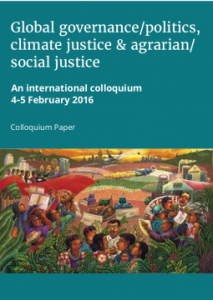 The recent political and economic liberalization in Burma/Myanmar, while indicative of some positive steps toward democratisation, has increased foreign and domestic investments and geared the economy toward industrialisation and large-scale agriculture. Land governance procedures and implementation tend to favour the more powerful and well-connected, with little protection mechanism for the majority smallholding farmers in the country.
The recent political and economic liberalization in Burma/Myanmar, while indicative of some positive steps toward democratisation, has increased foreign and domestic investments and geared the economy toward industrialisation and large-scale agriculture. Land governance procedures and implementation tend to favour the more powerful and well-connected, with little protection mechanism for the majority smallholding farmers in the country.
Myanmar Extractive Industries Transparency Initiative (MEITI) Report for the period April 2013- March 2014 Oil, Gas and Mining Sectors
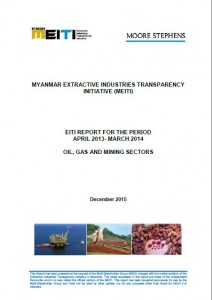 The purpose of this Report is to reconcile the data provided by companies operating in the extractive sector (hereafter referred to as “Companies”) with the data provided by relevant Government Ministries and Bodies (hereinafter referred to as “Government Bodies”) […]
The purpose of this Report is to reconcile the data provided by companies operating in the extractive sector (hereafter referred to as “Companies”) with the data provided by relevant Government Ministries and Bodies (hereinafter referred to as “Government Bodies”) […]
The Meaning of Land in Myanmar
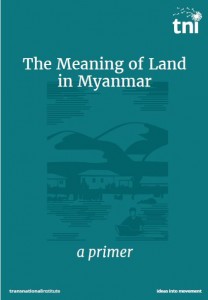 “Land is like our vein; it is vital for our living. After our land was confiscated, we don’t know what to do for our livelihood,” says a farmer from Kachin State in Myanmar […]
“Land is like our vein; it is vital for our living. After our land was confiscated, we don’t know what to do for our livelihood,” says a farmer from Kachin State in Myanmar […]
The Need for Peace and Inclusion
The peoples of Myanmar have long desired a platform for inclusive peace and dialogue where the vital issues of politics, economics, welfare and human rights for all can be discussed together, fully and in a spirit of national reconcilitation and cooperation. Thus any initiative towards peace and dialogue is always welcome […]
• • •UNFC on NCA and Internal Peace
Burma/Myanmar, after receiving independence on January 4, 1948 from the British colonialists in accordance with the Panlong Agreement, was accompanied by the civil war. Since the rulers of successive eras have tried to end the civil war, in disregard of the Panlong Agreement, they have not met with any success, up to this day, and people of all the nationalities have to continue to suffer the malicious caprices and dreadful consequences of war […]
• • •Killing, Disappearance, Land-mine Death During Burma Army Offensive in Central Shan State
This update documents further incidents of abuse against civilians committed by Burmese government troops during their offensive in central Shan State since early October 2015. SHRF has documented the killing of a displaced farmer on November 13, and the disappearance of another, near Mong Ark, Mong Hsu township […]
• • •တစ္ေက်ာ့ျပန္ – မူလအေျခအေနဆိုးသို႔ ျပန္လည္ဆိုက္ေရာက္လာသည့္ ေရႊႀတိဂံေဒသ
TNI ၏ ေရႊႀတိဂံေဒသအတြင္းရွိ တရားမ၀င္မူးယစ္ေဆး၀ါးေစ်းကြက္အေပၚ ႏိႈက္ႏိႈက္ခၽြတ္ခၽြတ္ေလ့လာ ဆန္းစစ္ခ်က္အရဘိန္းစိုက္ပ်ိဳးထုတ္လုပ္မႈ ႏွစ္ဆခန္႔ျပန္လည္ျမင့္တက္လာသည့္အျပင္ ေထာင္သြင္းအက်ဥ္းခ်ခံထားရသူ မ်ားျပားလာၿပီး အေသးစားတစ္ႏိုင္တစ္ပိုင္ ေတာင္သူငယ္ေလးမ်ားအေပၚ ျပင္းျပင္းထန္ထန္ ႏွိပ္ကြပ္လ်က္ရွိေၾကာင္း ေတြ႔ရွိခဲ့ရသည္ […]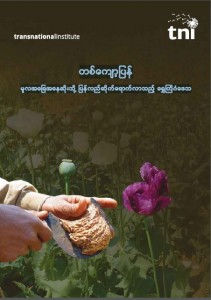
Myanmar Opium Farmers’ Forum Report Published Today
Today the Myanmar Opium Farmers’ Forum released the report of its third meeting. The report stresses that farmers grow opium to ensure food security for their families and to provide for basic needs, and to have access to health and education. According to the report, “The large majority of opium farmers are not rich and grow it for their survival. Therefore, they should not be treated as criminals […]”
• • •Entrenched poverty or decent jobs for garment workers?
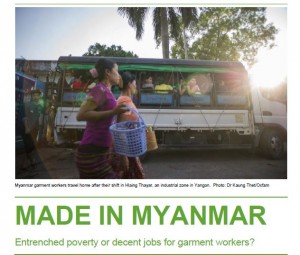 In Myanmar, the garment industry is booming thanks to an upsurge in investment by international brands, but garment workers are facing tough conditions. According to new research from Oxfam and labour rights groups in Myanmar, garment workers are working up to 11 hours a day, six days a week, but remain trapped in poverty […]
In Myanmar, the garment industry is booming thanks to an upsurge in investment by international brands, but garment workers are facing tough conditions. According to new research from Oxfam and labour rights groups in Myanmar, garment workers are working up to 11 hours a day, six days a week, but remain trapped in poverty […]
Commentary: The 2015 General Election: A New Beginning?
The resounding victory of the National League for Democracy in the November general election has raised hopes in Myanmar and around the world that, finally, the country could be on the road towards peace and democracy. Sadly, there have been too many failures in the past for simple optimism now […]
• • •
 All posts
All posts